65% of Tinubu’s speech focused on self-praise, not hunger and hardship in Nigeria – Forensic analysis
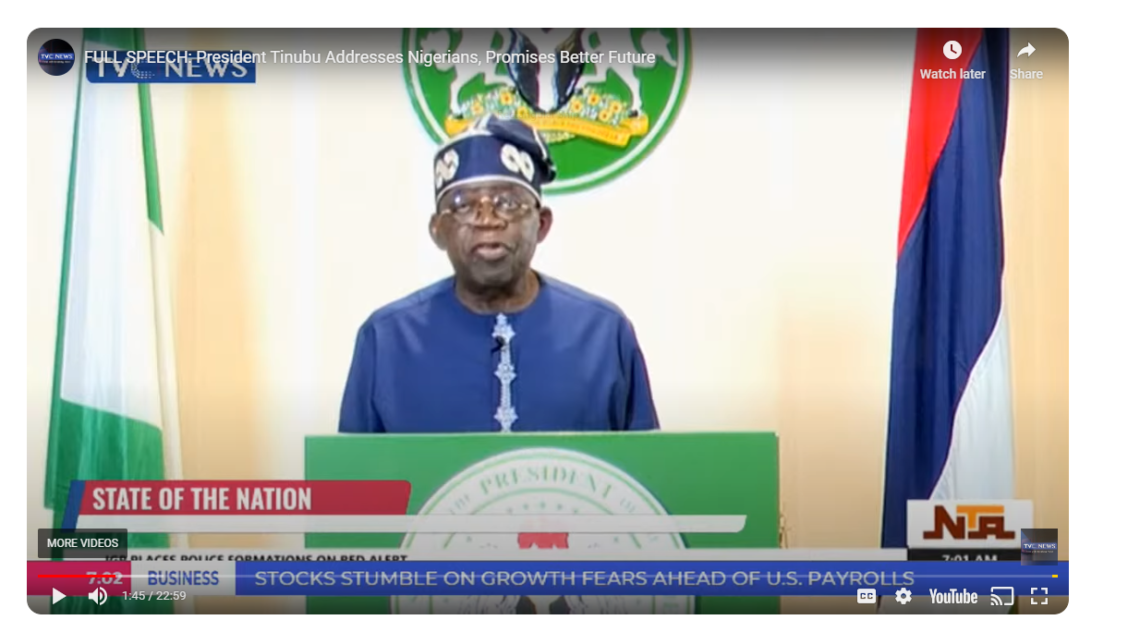
Key Points:
-
The speech was devoted to recounting what this government has achieved, some not relevant to the protests
-
It didn’t directly address the issue of hunger and hardship
-
The mood was more of a threat than compassion for suffering Nigerians
-
The president was not exact with data about the negative impacts of the protests
-
The speech did not provide a timeline for the ease of the hardship
By Theophilus Abbah
Forensic analysis of statements is meant to authenticate their authorship and discover the degree of truthfulness or deception of such statements. It is carried out by comparing the contents of statements with facts, figures, and contexts that they reference. This brief exercise is to use forensic linguistic methods to detect how factual, relevant, and reliable President Bola Ahmed Tinubu’s speech on Sunday, August 4, 2024, was to the demands of the protesters. The speech was delivered on the fourth day of the mass protests over the difficult economic conditions that have made survival very difficult. The word-count of the speech is 2,005, made up of 37 paragraphs, 94 sentences, and 144 lines.
Reference of the president’s speech to protesters’ demands:
In discourses, like the President’s address to the nation in response to nationwide protests, the rule of linguistics requires that references be made to the subject-matter or issues raised by the protesters. In the case of the ‘August Protests’, the protesters took to the streets in multitude to press for certain demands. Of all the demands that they made, two words stood out: hunger and hardship. Though they demanded for the restoration of fuel subsidy, the call was anchored on the negative impact of the subsidy removal on the people – high cost of living. Over the last 14 months, the cost of food items skyrocketed beyond the reach of Nigerians. A loaf of bread jumped from N800 to N2,000; a 50-kg bag of rice from N40,000 to N80,000; a tuber of yam from less than N1,000 to about N5,000; and a 50kg bag of beans from about N30,000 to over N120,000. For many average Nigerians, these essential food items are not affordable.

Photographs from the protests show them asking for an end to hunger and poverty
However, when the president spoke to Nigerians on Sunday August 4, 2024, the two main words ‘hunger’ and ‘hardship’ did not feature in the 2,005-word speech. The president failed to mention the astronomical cost of living, one of the reasons for which Nigerians trooped out in support of the hashtag #EndBadGovernance. The clauses in Tinubu’s speech that approximate references to the hardships are found in the expression in line 121: “I have heard you loud and clear,” and “I understand the pain and frustration that drive these protests” (line 122). The president had used the same expressions on March 1, 2023, to appease youths who did not vote for him in the 2023 elections. The expressions were not really crafted to address the ongoing protests. They sounded like the president’s own formulaic response to any demands by Nigerian youths. Therefore, for Nigerians who expected their president to roll out immediate measures that would bring down the prices of food, the 2,000 words were rather irrelevant and empty. When Tinubu made allusion to food production, he did so in another context that will be discussed below.
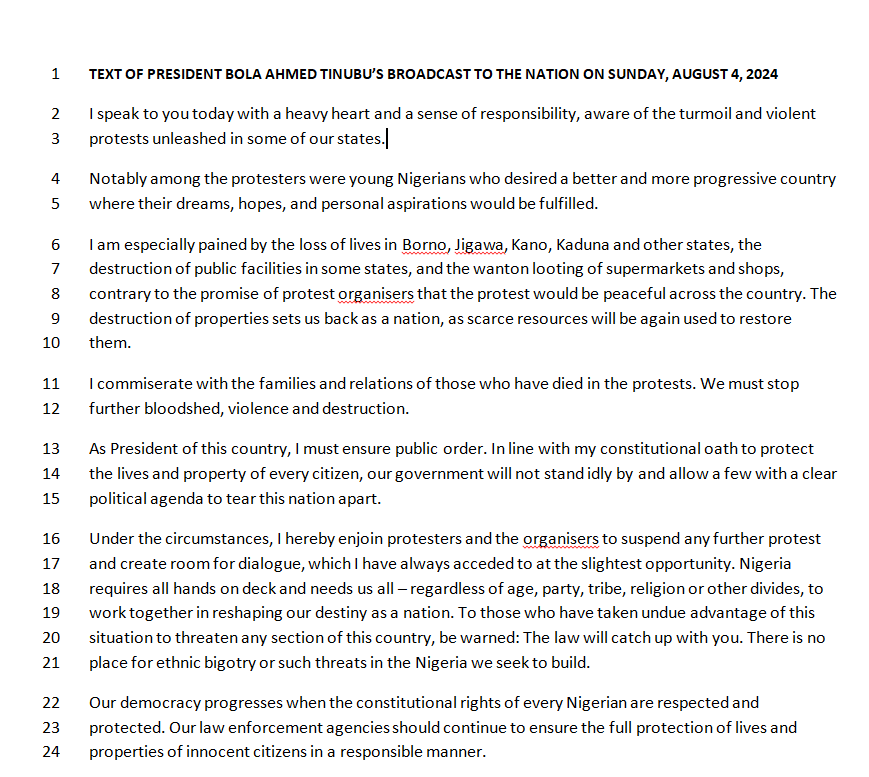
Bromide on the president’s speech
Level of exactness in the speech:
A high level of exactness is expected from any speech from the president’s table because he has access to exclusive intelligence information that the ordinary Nigerian cannot access. Exactness means the act of being detailed, thorough, or accurate in the information a speaker presents to his audience. This time, the speaker was President Bola Ahmed Tinubu.
The president’s broadcast was expected to have addressed specific issues and incidents related to the protests, but Tinubu was not as exact as expected; perhaps, his speech writers apparently glossed over details. But that gave the impression that the president was unaware of the intensity of the protests and their impact on the Nigerian people. First, in lines 6 to 10 of the speech, Tinubu talked about “the loss of lives in Borno, Jigawa, Kano, Kaduna, and other states.” Which are the other states? Are they not as important as the four mentioned? What determined the choice of states he mentioned in the speech? How many lives were lost?
If the president were following the turn of events, some 18 persons had been killed in seven states, but there was serious tension in 10 states. The president mentioned only four out of the 10 states, leaving out the Federal Capital Territory, where the Aso Rock Presidential Villa is located, and two neighbouring states, Niger and Nasarawa States. There was violence in Gombe, Katsina, Kebbi, and Yobe States as well. Was the president unaware of the killings and destructions in these other states? What became obvious from the speech was that either the president did not pay attention to the progression of the protests, or that his speech writers deliberately downplayed the incidents in order to give the impression that the protest was a failure.
Those behind the ‘political agenda’ of the protests:
Several phrases and clauses in the broadcast demonstrate the thinking of those in Tinubu’s kitchen cabinet who may have drafted the speech. They blamed others for the consequences of their own actions and inaction. First, the president blamed the ‘protest organizers’ for “the destruction of public facilities in some states and the wanton looting of supermarkets and shops” (lines 6-10). In doing so, he ignored the high-handedness of the security operatives who threw teargas at orderly protesters and inflamed tempers. Many reports point to the fact that security operatives attacked journalists and protesters and stirred up anger and violence among many protesters.
Another category of people blamed for the protests were “a few with a clear political agenda to tear this nation apart” (line 15). But the protesters’ demands were not related to ethnic, regional, or even religious divisions. Political agenda is an essential element of any democracy, but using it to ‘tear the nation apart’ is very dangerous. Those who plan to tear the nation apart must be brought to book.
The president blamed past governments for the current predicaments
However, in the first few days of the protests, the protesters did not ask the president to quit; nor did they call for a change of government. Rather, they demanded an end to hunger and hardship. The purpose of government is to provide security and a means of survival for the people. In a democracy, the people are at liberty to demand the removal of the yoke from their shoulders. To blame such demands on unnamed persons’ ‘political agenda’ may actually be an overkill.
The president blamed past governments for the current predicaments when he said in lines 28 that “for decades, our economy has remained anaemic and taken a dip because of many misalignments that have stunted our growth.” If the previous governments’ economic judgments and actions were wrong, how has this one that has thrown the people into intense hardship been the best for Nigeria? Two fiscal and monetary policies led to the current predicaments: the removal of fuel subsidy and the floating of the Naira. With a careful risk analysis, the government would have discovered that hunger and hardship were risk factors and should have put in place measures to cushion their effects before taking such decisions.
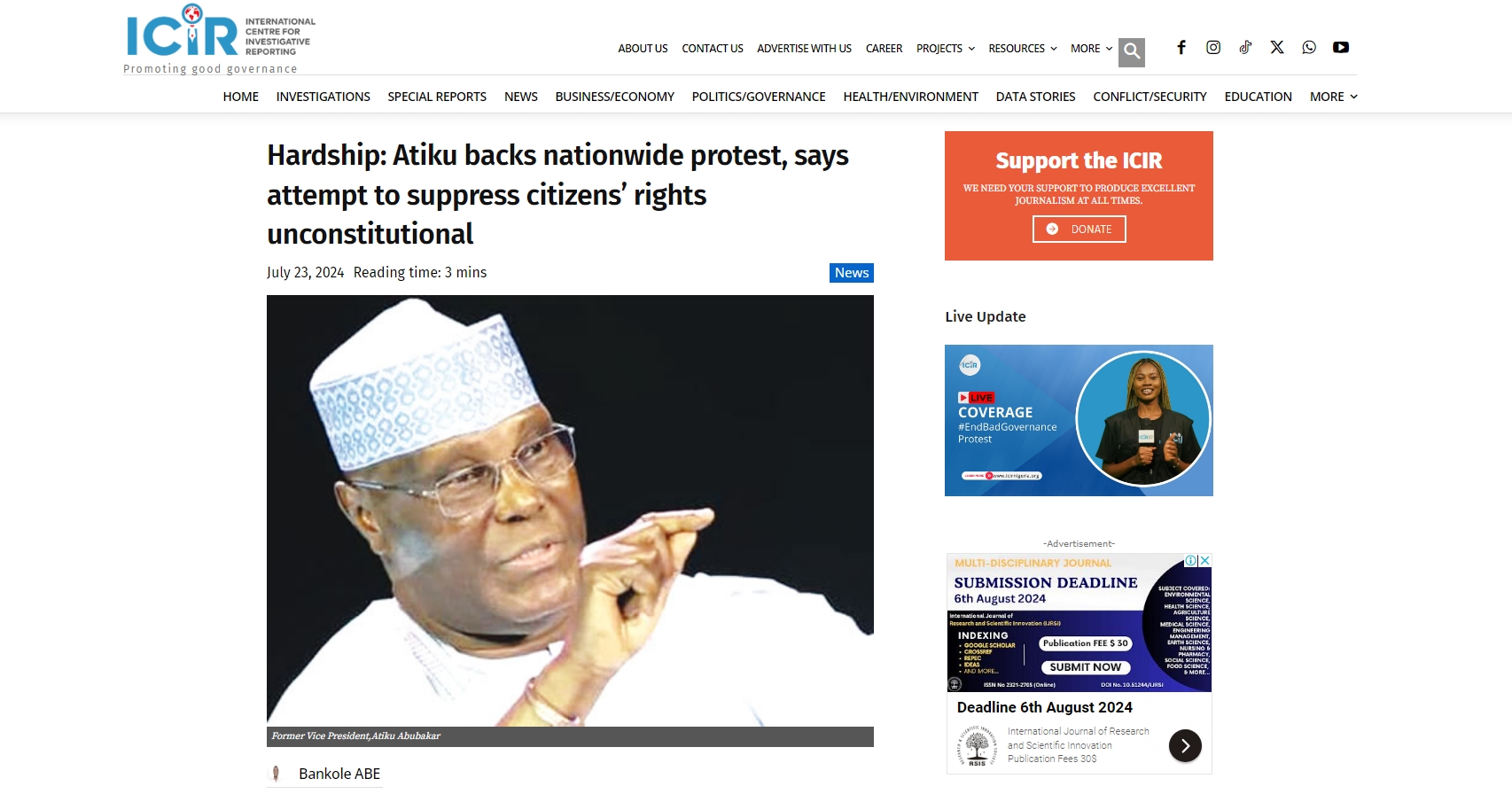
Former Vice-President Atiku Abubakar spoke about hardship, not any other political agenda.
The removal of subsidy on fuel was not a creative approach to Nigeria’s economic problems; it had been on the table, and several previous governments approached it with caution in order not to inflict severe pain on the people. But this government inflicted the harshest of pains by removing the subsidy in one fell swoop and making the value of the Naira to crash in the name of floating the currency. Tinubu must take responsibility for it; previous governments should not.
Tinubu spoke more about the future, not the present hunger:
The president used the verb ‘will’ many times to refer to projects that were yet to yield fruit. The verb appeared 16 times in the speech. For example, while explaining the plans to roll out Compressed Natural Gas (CNG) to power transportation, the president said, “We will be distributing a million kits of extremely low or no cost to commercial vehicles” (lines 70-72). He also talked about the Digital and Creative Enterprise (IDiCE) project, meant to create three million jobs, in this tense: “[the] program [is] to empower our young people, creating millions of IT and technical jobs that will make them globally competitive.”
Other statements pointing to the future include, “We are also launching the Renewed Hope Estates in every state”; “Our target is to cultivate more than 10 million hectares of land to grow what we eat.” The president even talked about a future joy: “We are working hard for you, and the results will soon be visible and concrete for everyone to see, feel, and enjoy.” (lines 132-134).
But the country is tired of promises, whether they are about CNG vehicles; affordable housing; digital revolution to create jobs for youths; and the like. For instance, the promise to flood Nigerian streets with CNG vehicles has been made since 2020. Both former Vice-President Yemi Osinbajo and Minister of State for Petroleum Timipreye Sylva claimed the Buhari government was going to subsidize the conversion of vehicles from petrol-only to CNG alternatives. It didn’t happen.
Tinubu would not be the first to promise affordable housing. The Buhari government spent billions of Naira on houses that lay waste in many states, because they were not affordable. For a speech that was meant to douse tension, breathing life into failed promises was an exercise in futility.
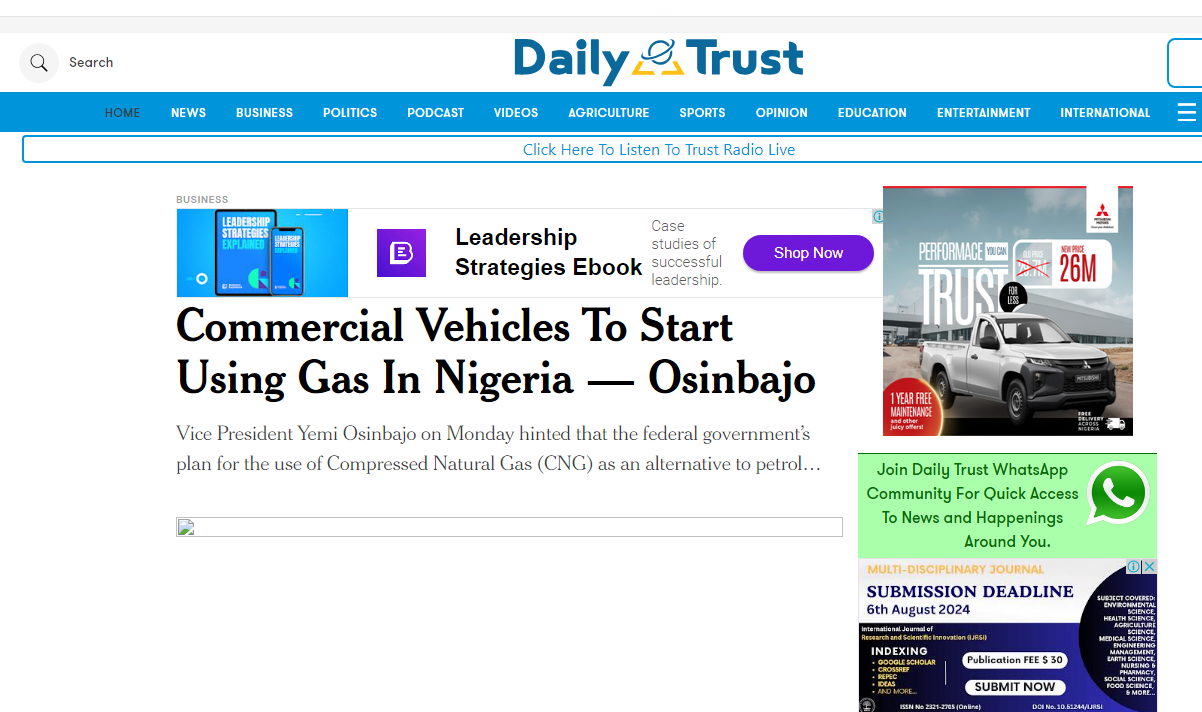
President Tinubu spoke about CNG buses, which the previous government had promised Nigerians since 2020.
More about self-praise:
Self-praise is the act or an instance of expressing commendation for oneself. The president’s speech contains 2,005 words. Out of this, 1,302 dwell on commending what his government has ‘achieved’ in the last 14 months. However, the majority of the projects for which he commended himself were a catalogue of the things this government has in the pipeline – for the good of Nigerians. But many things in the Nigerian government’s pipelines hardly arrive at their destinations, due to vandalism. Apart from using so many words, approximately 65% of the text, to praise his government, in several areas there is the multiplicity of the use of the personal pronouns ‘I’, ‘my’, and “we.” In the text, the use of the person pronoun “we” occurred 35 times; “I” appeared 15 times; and “my” appeared five times.
We have self-praising sentences like: “We have also cleared legitimate outstanding foreign exchange obligations of about $5 billion without any adverse impact on our programmes” (lines 47, 48). “We are working to complete inherited projects critical to our economic prosperity, including roads, bridges, railways, power, and oil and gas developments” (lines 54-56). “We increased our oil production to 1.61 million barrels per day, and our gas assets are receiving the attention they deserve” (lines 60,61). “This week, I ordered the release of an additional N50 billion each for NELFUND – the student loan, and Credit Corporation from the proceeds of crime recovered by the EFCC” (lines 81-83). “I inaugurated the first phase of our ambitious housing initiative” (line 102-108); “and I am leading the charge as your president” (line 126).
Most of these achievements, for which the president praised himself and his executive, did not directly speak to the present hunger and hardship; they are about an uncertain future, uncertain because many similar promises made in the past did not materialize.
August 1 Protesters Give Tinubu Tall Order; Read The Long List of Their Demands: – The Insight
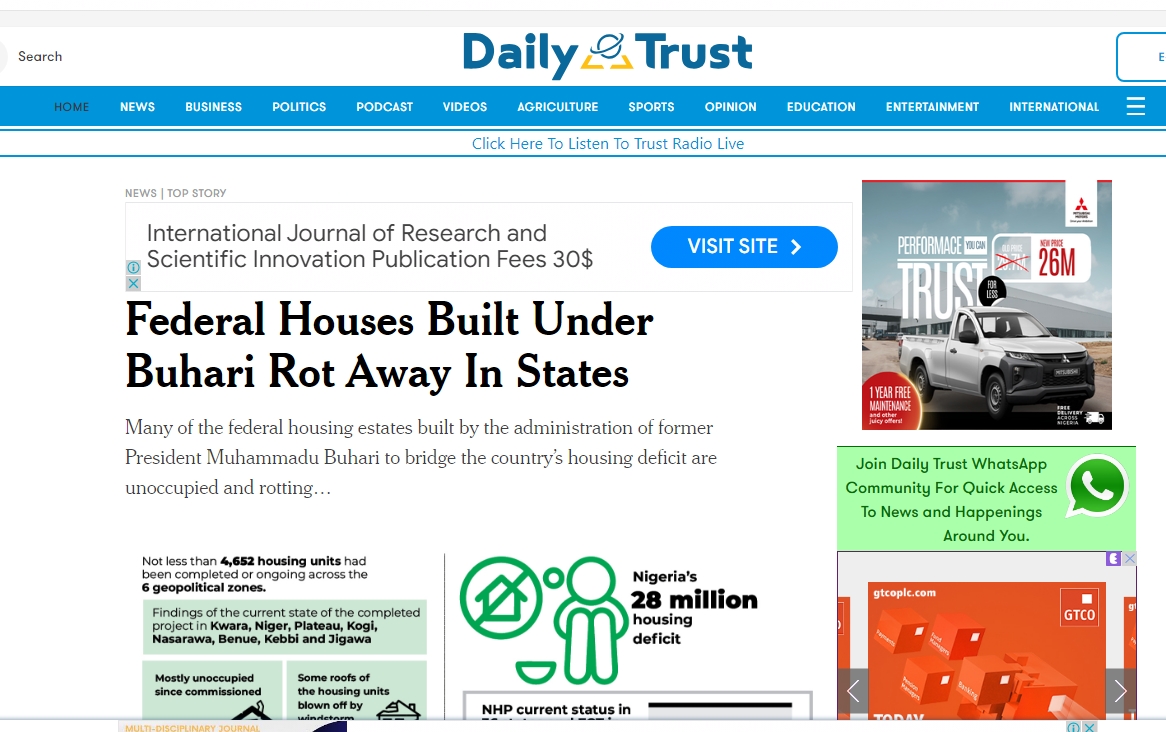
President Tinubu promises more houses. But those built by the previous regime now rot away.
Threatening mood rather than compassion
There are a few phrases that show affection in the entire speech, like the kinship terms and colloquial phrase, “my brothers and sisters” (line 46) and the formulaic “my dear Nigerians” (line 121); and “a heavy heart” (line 2). Others are, “I’m especially pained by the loss of lives” (line 6); and “I commiserate with the families and relations” (line 10). One other thing that seems to show affection towards the people is “fellow Nigerians” (line 64).
However, the mood of the speech was more authoritarian, more of a threat than compassion. We sense a use of dreaded force in paragraph 5, after the brief ‘regret’ over violence. In line 13 we read: “I must ensure public order”, with an auxiliary verb ‘must’ which connotes imperative action. We encounter phrases like “constitutional oath”’; “I hereby enjoin protesters …” (line 16); “be warned” (line 20); “the law will catch up with you” (line 20); “our law enforcement agencies should continue to…” (line 23); “security operatives should continue to maintain peace, law, and order” (line 140). At the end of the speech, listeners may not be consoled. No wonder, many Nigerians claimed that it was a say-nothing broadcast.
Too much stale information; little freshness
In general, the speech lacked quotable quotes or anything really solid for Nigerians to chew. Questions like, ‘Why is the cost of food items too high? Why can’t government control inflation?’ ‘What is the timeline for government’s investments to bear fruit?’ ‘How would the prices of food items be reduced to affordable rates?’ If the president had devoted the speech to issues of this nature, it would have made a positive impact on Nigerians.
For instance, Nigerians are aware that food scarcity is linked to the activities of bandits who have chased away farmers from their farmlands. They expected to hear what government would do to reclaim farmlands and encourage the cultivation of crops. The price of petrol is too high. This is not totally due to the removal of subsidy. It is due to the importation of petroleum products. So, when will government-owned local refineries pump out locally- refined products in order to reduce the pump price of petrol? How would the removal of duty on food import bring down the prices of food? When will the initial consignments of imported food items arrive in Nigeria?
If the speech had responded to questions of this nature, it would have engendered a measure of hope. Instead, the speech writers populated the text with government policies like students’ loans, CNG buses, monies made available to governors, fertilizers which are never available to farmers, housing projects, oil production, etc. Everything the president referred to in his speech had been made public earlier by the Minister of Information, Mohammed Idris, and other government officials. They had been shared popularly on social media. They were not fresh and exciting.
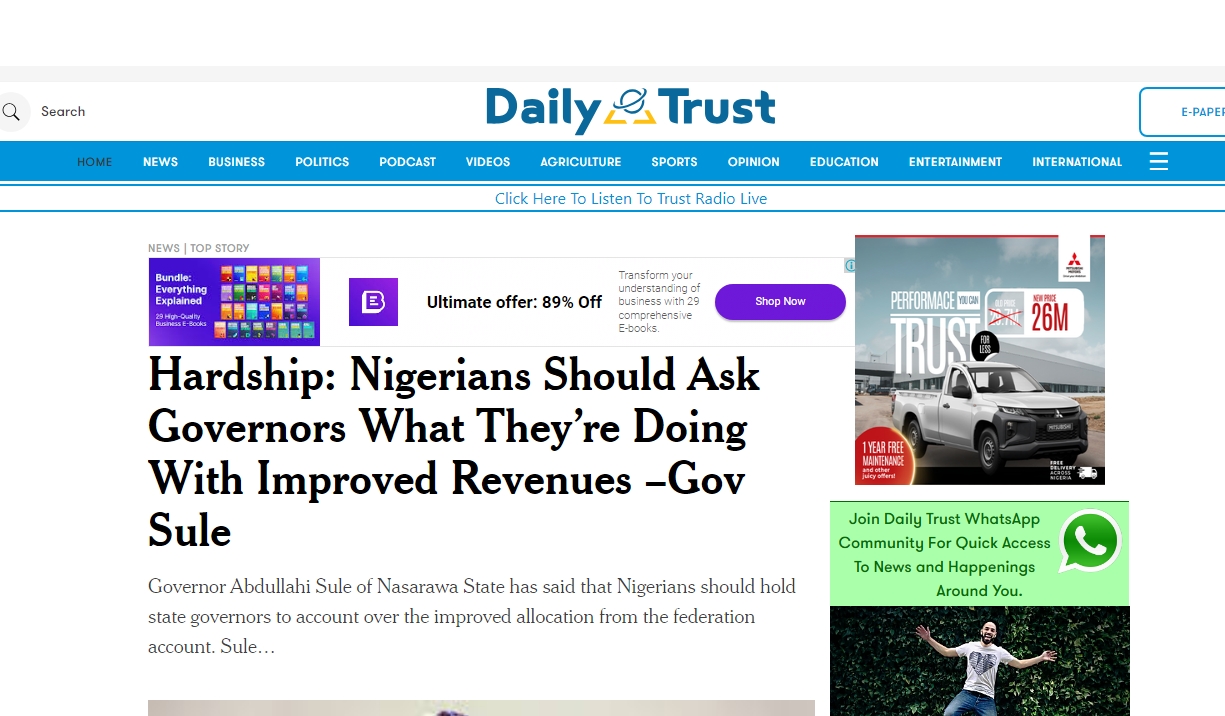
The Governor of Nasarawa State, Abdullahi Sule, spoke earlier about N570 billion that went to governors. The president repeated it in his speech.
The Insight Report
Nigeria Coverage

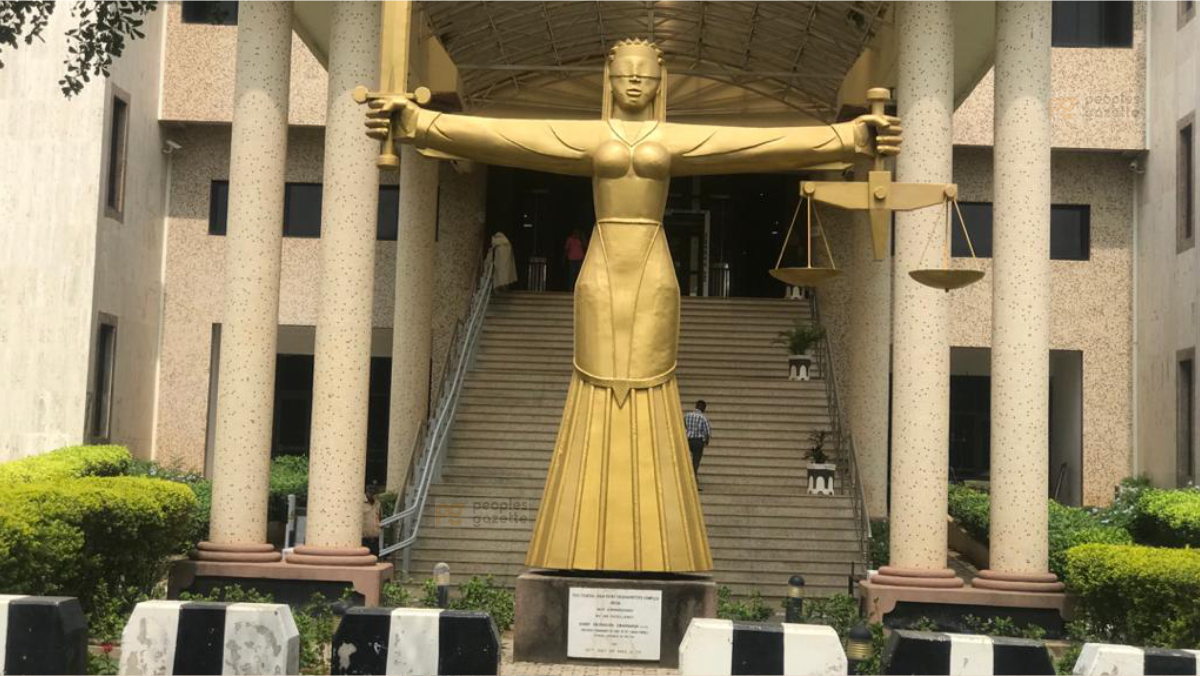
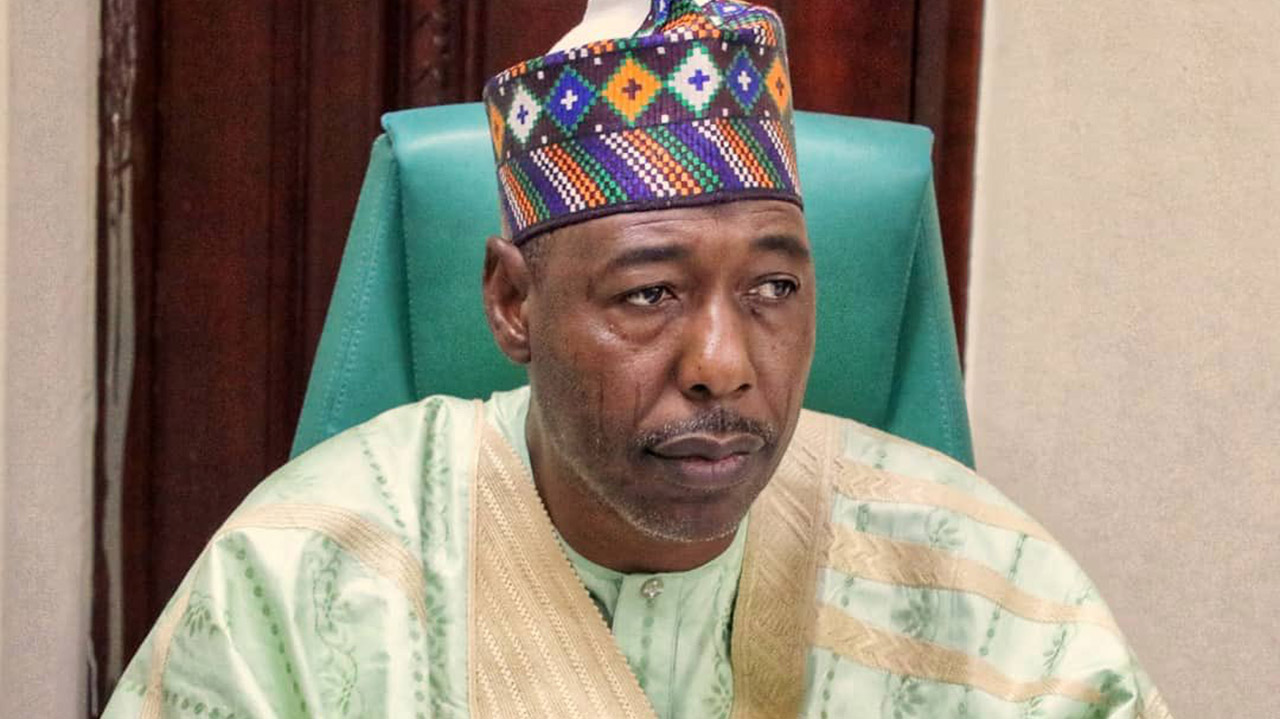
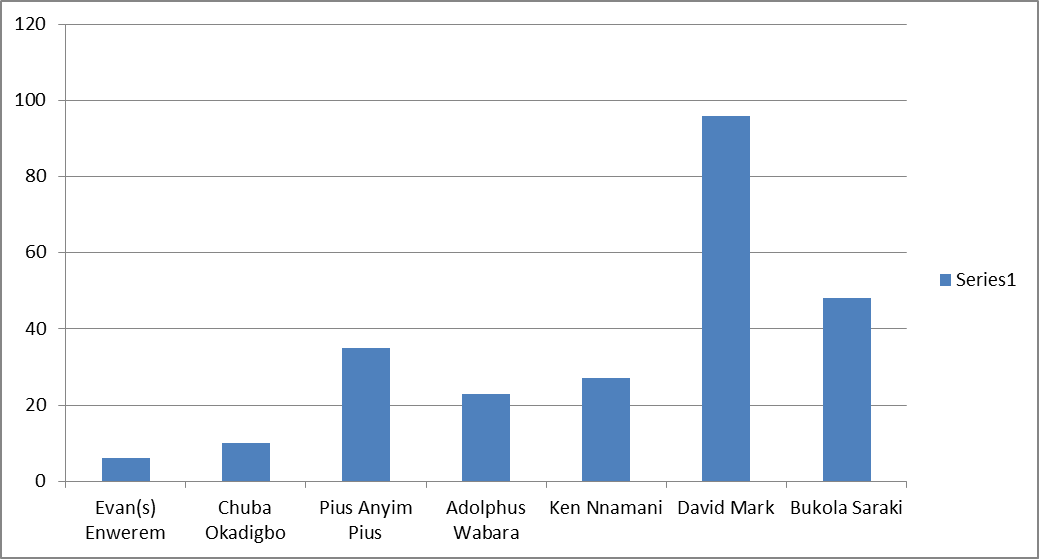
today says:
I really like what you guys tend to be up too. This type of clever work
and reporting! Keep up the great works guys I’ve added you guys to my personal blogroll.
Dylan says:
I need to to thank you for this excellent read!!
I certainly enjoyed every little bit of it. I’ve got you book marked to check out new stuff you post…